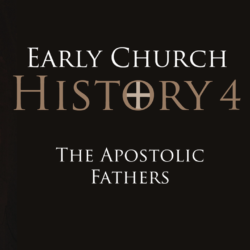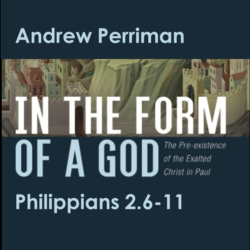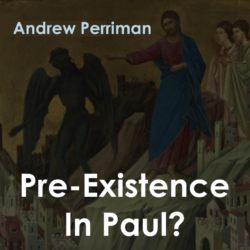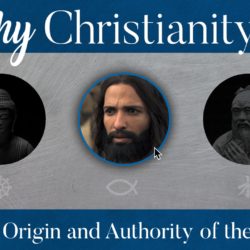This is our first of five examples of bias in translation. Today we’ll examine Philippians 2.6-7, specifically focusing on how translators render two important words (ἁρπαγμός harpagmon and μορφή morphe). We’ll see how a couple of the most popular evangelical versions break free from the underlying Greek syntax in order to inject their own doctrinal bias into scripture. Regardless of your own interpretation of this passage, can we all agree that translators should not read their beliefs into scripture?
—— Books ——
- A Greek-English Lexicon of the New Testament and Other Early Christian Literature, 3rd Edition (BDAG)
- New American Bible (NAB)
- The New Oxford Annotated Bible (NRSV)
- Truth in Translation by Jason David BeDuhn
—— Links ——
- Check out all the lectures in How We Got the Bible
- See what other classes are available here or on the Restitutio Classes podcast (subscribe in Apple, Spotify, RSS feed)
- If you’d like to support Restitutio, you can donate here.
- Intro music: Good Vibes by MBB Attribution-ShareAlike 3.0 Unported (CC BY-SA 3.0) Free Download / Stream: Music promoted by Audio Library







Sean – I felt compeled to finally write a comment. These teaching nuggets have been awesome. You are easy to listen to. You don’t come off arrogant yet you can tell you are well educated on the topic at hand. Thank you for putting these together for you fellow Christians! May your ministry continue to be blessed!
In his commentary on Philippians (Eerdmans, 2009) Dr. Walter Hansen notes the many similarities with the suffering “servant songs of Isaiah” (chapters 42 to 53).
For example, Paul says the Messiah was in the “form of a servant” (v.7) and Isaiah 52:13-14 says “Behold my servant, his form marred beyond human likeness.”
And according to the TDNT (paid theou, vol. 5) the Greek phrase translated “emptied himself” is an expression “not attested elsewhere in Greek…an exact translation of [the Hebrew of Isa 53:12, his soul…he poured out].” In other words, “the use of Isa 53.12 shows that the expression he emptied himself implies the surrender of life, not the kenosis of the incarnation.”
PS the so-called “kenosis” theory states that in order to “assume” or “take on flesh,” the 2nd Person of the Trinity (“God the Son”) “emptied” Himself of certain powers and attributes.
That’s very interesting, Carlos – but doesn’t Dr. Walter Hansen (as a Trinitarian) nevertheless believe that Phil. 2:5-11 teaches Christ’s literal, pre-existence?
Yes, they’re double-minded.
That’s partly why we quote the Dunn, Hurtado, Wright, et al., of the world, to warn people (1Tim 4).
Hermanos Carlos;
What they give with one hand, they take with another!
God bless you, Carlos.
Carlos,
I’m not so sure it is a good idea to quote Trinitarian writers as though they are supporting Biblical Unitarian points, when in fact they firmly hold to some form of preexistence. Why quote them at all as an authority if one is going to then question their sanity and thus their authority? If they are “double-minded” then their opinions are worthless. Why quote them?
There is no question that Phil. 2:8 has Isaiah 52-53 in view. But Isaiah’s prophecy says absolutely nothing about what is contained in Phil. 2:6-7. Where is the suffering Servant said to be “in the form of God” or was contemplating “equality with God?” The “kenosis” (self-emptying) is an aorist indicative verb (main verb of independent clause), followed by two aorist participle clauses: “taking the form of a servant” and “becoming in the likeness of men.” These two clauses modify the main clause, “He emptied Himself,” being participles of means. This construction shows that the two following dependent clauses are further describing the “self-emptying.” The time relationships of aorist indicative verbs followed by modifying aorist participles is simultaneous (Wallace, GGBB, p. 630). Wallace, who correctly analyzed the grammar of this verse, struggled to make “self-emptying” fit with Trinitarianism’s “hypostatic union” concept. The NASB translates it correctly, “but emptied Himself, taking the form of a bond-servant, and being made in the likeness of men.” The critical point is that “emptying Himself” is not what led to His death, but resulted rather in His “becoming in the likeness of men.” Not until after His “being found in appearance as a man” (the result of “being made [lit. becoming] in the likeness of men”), was He then found to be human. After this, He humbled Himself by becoming obedient to the point of death.” The same verb (ginomai) is used for his “becoming in the likeness of men” and later “becoming obedient to the point of death,” both of which require a previous state where these did not apply to Him. The pivotal point in time in this passage is when He “became in the likeness of men.” Before that, He was not “in the likeness of men,” and after this was completed, He “humbled Himself and became obedient unto death.” The grammar will not allow His self-emptying and His self-humbling and then submitting unto death to be the same thing or occur at the same time. The grammar absolutely requires the above sequence. This passage refutes Trinitarianism’s “hypostatic union” of two natures in Christ. There are two natures, but they are not simultaneous, but sequential. It also refutes Biblical Unitarianism because it clearly shows that at one time the Son of God existed but was not yet “in the likeness of men” or found “in fashion as a man.”
“For you know the grace of our Lord Jesus Christ, that though He was rich, yet for your sake He became poor, that you through His poverty might become rich.” (2 Cor. 8:9 NASB)
Hi, Tim;
I know your comments were meant for Carlos, but can I just tell you that an excellent exposition of a non-literal pre-existence view of Messiah Jesus, is given online by Professor James Dunn. Jeremiah Tuvilla has posted a PDF of Dunn’s classic textbook “The Theology of Paul the Apostle” (Eerdman’s Press), on his (Tuvilla’s) account at ‘Academia[dot]edu’. Dunn devotes Chapter 11, section 4, for a Pauline exposition of Phil. 2:6-11.
God bless you, Tim.
Tim,
We all appeal to “authorities” don’t we?
My point about the double-minded person is simply they speak truth and error. It’s for the audience to decide as a good Berean if that is true, i.e., speaking out of both sides.
And I’ll just repost here what I wrote on your blog for the benefit of this audience.
First, the Greek word monogenes is a compound Greek word, i.e., monos = “unique” or “only one” and genes “kind,” from the Greek gennao. The latter (gennao) is used throughout the genealogies of both Old and New Testaments to refer to fathers begetting, i.e., procreating children. As a result, Matthew 1:20 describes the one who is begotten (gennethen, from the root gennao) in Mary by the power of God’s spirit.
According to standard Greek lexicons the word gennao means “to cause something to come into existence, primarily through procreation.” (See Alfred Rahlfs, Genesis 1926, 39.)
That the Son came into existence via procreation in Mary was the understanding of the Apostle Paul as well, when he says in Gal 4.4a: “When the fullness of time was come, God sent forth his Son made [genomenon] of a woman.”
The Greek translated “made” is from the verb ginomai which according to Bauer’s Lexicon means “to come into being, existence through the process of birth.” (Cp. Thayer’s Lexicon: “To become, i.e. to come into existence, begin to be, receive being.”)
So for the NT Gospel writers the Son comes into being, into existence, inside his mother’s womb and not from outside (as your literal preexistence view theorizes).
We also have the testimony of the angels of the LORD who appeared to both Mary and Joseph saying the Son was begotten, I.e., procreated in the womb. Again, many trinis admit these simple, grammatical biblical facts, like the noted Catholic Raymond Brown:
“The fact that Matthew can speak of Jesus as ‘begotten’ (passive of gennan) in 1:16, 20 suggests that for him the conception through the agency of the Holy Spirit is the becoming of God’s Son.” Birth of the Messiah, p 140.
Second, the TDNT on their “pais theou” article (vol. 5, pp 711-12) note “The decisive proof of the thesis that the Christology of Phil. 2:6-9 is rooted in Is. 53 HT [Hebrew Text] lies in the fact that the expression ’emptied himself’ (Phil. 2:7), which is not attested elsewhere in Gk. and is grammatically extremely harsh, is an exact translation of ‘his soul…he poured out’ (Is. 53:12).”
In a footnote to this quote [#445] the TDNT article adds “The use of Isa 53.12 shows that the expression [he emptied himself] implies the surrender of life, not the kenosis of the incarnation,” i.e., nothing to do with some preexistent person entering into flesh.
For more see “The Servant of God” by Walther Zimmerli, Joachim Jeremias (2009, pp 97-98).
Carlos,
I appreciate the reply. But this does not address the grammatical problem for Biblical Unitarians in Phil. 2:7, which is that “He emptied Himself” is explained by the two aorist participle clauses, “by taking the form of a servant” and “becoming in the likeness of men.” No one is disputing that verse 8 corresponds with Isaiah 53. That is obvious. What is required by the Greek grammar of verse 7 is that God’s Son contemplated His station and equality with God, after which He chose to “empty Himself” by “taking the form of a servant and BECOMING (ginomai) in the likeness of men.” This last clause is then reinforced by the beginning of verse 8, “And being found in fashion as a man…” The word “fashion” is “schema” from which we get the English “schematic,” which refers to design. The statement, “becoming in the likeness of men,” requires a beginning of humanity, as a man. The clause “being found in fashion as a man” indicates a state of being human. Neither of these clauses make any sense in the Biblical Unitarian paradigm. The grammar demands that He was neither of these things before He “emptied Himself.” Only after becoming human did He “humble Himself, becoming obedient unto death.” This last statement alone corresponds with Isa. 53:12. There is nothing in Isaiah 53 which corresponds with Phil. 2:6-7 as far as I can see. If you disagree, maybe you can point it out for me.
God Bless
Tim,
The point, once again, this time by the prominent trinitarian Gundry (A Survey of the NT, 5th ed. p 471).
“What did Christ empty himself? Of divine metaphysical attributes, such as omnipotence, omniscience, and omnipresence (though not of divine moral attributes, such as love and justice)? But he often displayed these metaphysical attributes according to the Gospel accounts of his earthly ministry. Of the independent exercise of those attributes (compare John 5:19)? But had he ever acted independently of the Father? Or simply of the outward glory of his deity? But does not ‘himself’ require something inward? Perhaps then the self-emptying does not refer to incarnation at all, but to Jesus’ expiring on the cross. If so, there is synonymous parallelism with a reference to death in the following verse and a possible allusion to Isaiah 53:12: “he poured out [that is, emptied] his soul [a Hebrew equivalent of ‘himself] to death.”
Carlos,
The reason that Gundry makes that claim is because as a Trinitarian he cannot accept any “self-emptying” of the Son’s divinity (as the text demands), His being completely transformed into a human with no divine nature at all. Trinitarians like Gundry believe in hypostatic union, that the divine Son merely cloaked Himself in flesh (in accordance with the Platonic view of man). This is why you can find plenty Trinitarians who resist what the text plainly says. In fact, Pope Pius XII in his Encyclical on the Council of Chalcedon, Sempiternus Rex Christus (1951) condemned what we believe (and what the earliest Christian writers from the second century claimed) before the Platonic “incarnation” was introduced by Melito of Sardis (God in a flesh suit).
“There is another enemy of the faith of Chalcedon, widely diffused outside the fold of the Catholic religion. This is an opinion for which a rashly and falsely understood sentence of St. Paul’s Epistle to the Philippians (ii, 7), supplies a basis and a shape. This is called the kenotic doctrine, and according to it, they imagine that the divinity was taken away from the Word in Christ. It is a wicked invention, equally to be condemned with the Docetism opposed to it. It reduces the whole mystery of the Incarnation and Redemption to empty the bloodless imaginations. ‘With the entire and perfect nature of man’—thus grandly St. Leo the Great—’He Who was true God was born, complete in his own nature, complete in ours.’ (Ep. xxviii, 3. PL. Liv, 763. Cf. Serm. xxiii, 2. PL. lvi, 201).”
At 4Winds, we embrace this “wicked invention” and “enemy of the [Catholic] Faith” because it is what Scripture teaches, and it is what the very earliest Christians understood. What you guys appear to be missing is that this very passage proves that Jesus as Man was fully human, contrary to Trinitarianism. But you cannot use this passage against Trinitarianism’s “hypostatic union” because you will not accept a temporal preexistence.
Tim;
You imply that imply that “no true Greek scholar” would exegete Phil. 2:6-9 as portraying anything other than a literal, pre-existence Christology. However, this is what ‘The CTS New Catholic Bible’ says in a footnote to the the CTS translation of Philippians 2:6a ( “His state was divine” ) :
“Two interpretations compete. 1) Pre-existence (as here) : Jesus emptied himself of his divine privileges, to live and die as a man. This would be the clearest attribution of pre-existence to Jesus in Paul. 2) Second Adam (translating [Phil. 2:6a as] ‘being in the form of God’), cf. Rm 5:12d; 1 Co 15:22d. Both Adam and Jesus were made in the image of God. Unlike Adam, Jesus did not grab at divinity or pride or seek to escape death. Instead, he forwent divinity, humbled himself and accepted death.”
A footnote to Philippians 2:6a in the ‘New Jerusalem Bible’ (which translates Phil. 2:6a as “Who being in the form of God”) states a preference for the second interpretation, mentioned above. The footnote explains :
“More probably [as opposed to kenotic, pre-existence, Christologies] Jesus is here contrasted as the second with the first Adam, see Rm 5:12f..1 Co 15:22.. The first Adam, being in the form or image of God, attempted to grasp equality with God and, by this pride, fell. By contrast, Jesus, through his humility, was raised up by God to the divine glory.”
Conclusion : Roman Catholics have “no true Greek scholars” ?
Tim;
“The common belief that Philippians 2:6-11 starts by speaking of Christ’s pre-existent state and status, and then his incarnation is, in almost every case, a presupposition rather than a conclusion; a presupposition which again and again proves decisive in determining how disputed [Greek] terms within the Philippians hymn should be understood.”
James Dunn, echoing the view of Jerome Murphy-O’Connor, in Dunn’s “Christology in the Making”, p. 114.
Both of these leading Pauline scholars (et al) espoused the view that Philippians 2:5-11 referred solely to the earthly Christ, and not to an hypothesised, real, pre-existing one.
Furthermore, the fact that the Apostolic Kerygma as recorded in the “Acts of the Apostles” contains no mention of a literally pre-existent Christ, demonstrates that your theory was not part of original, Christian doctrinal fundamenta.
John,
Correct me if I am mistaken, but wasn’t Dunn affiliated with liberal scholarship and redefining Paul, a view that is certainly not the norm in conservative Christianity? What about the great majority of scholars who oppose his view on this passage? Why is Dunn to be believed but a host of others who disagree with Him not to be believed, such as the article in TDNT on this very passage? What biases was Dunn bringing to the text? Was he forcing the text simply to align with the “New Perspective on Paul”?
Why is it so difficult to have a serious discussion on a passage limited to the Greek grammar and sentence structure based simply on the accepted rules and norms of Greek grammar and syntax? Why does everything have to be an “appeal to authority” of specially selected scholars who happen to agree with Biblical Unitarians while ignoring the rest? How do you get out of the cycle of subjectivity and get back to being completely objective? If it does not begin with the grammar and syntax in critical passages such as this, where does it begin?
Every interpretation of every passage must first emerge from an exegesis of that very text. I am claiming that the Greek grammar, using normal and universally accepted principles, the normal meaning of words in Scripture, will NOT allow the interpretation that “emptied Himself” refers to His submitting to death. I am arguing that “becoming in the likeness of men” means that He was not previously “in the likeness of men.” I am not presupposing anything about this passage except that Paul used proper grammar, and used words in the way they were commonly understood and used elsewhere in Scripture. I would argue that Biblical Unitarians are the ones who are reading their ideas into the text and denying what is clearly stated. One does not even need to have much of a grasp of Greek. The idea comes through loud and clear in the English translations.
I had a much more in depth conversation with Carlos about this verse in the discussion below my video discussion with Anthony Buzzard which is posted on my blog, including about the Hebrew expression in Isa. 53:12 in case you care to look at it.
https://www.4windsfellowships.net/blog/live-debate-tim-warner-vs-anthony-buzzard-carlos-xavier/
Carlos & John,
If providing quotes from certain “scholars” who happen to agree with you on one particular point proves your case, then I propose to do the same. I would like to quote Hippolytus of Rome (AD 170-236), bishop, and native Greek-speaker who was far more familiar with the historical setting and Greek language than any modern scholar who is nearly 20 centuries removed. He read Phil. 2:6-11 in Greek, and interpreted it as follows:
“For as the only begotten Word of God, being God of God, emptied Himself, according to the Scriptures, humbling Himself of His own will to that which He was not before, and took unto Himself this vile flesh, and appeared in the “form of a servant,” and “became obedient to God the Father, even unto death,” so hereafter He is said to be “highly exalted;” and as if well-nigh He had it not by reason of His humanity, and as if it were in
the way of grace, He “receives the name which is above every name,” according to the word of the blessed Paul. But the matter, in truth, was not a “giving,” as for the first time, of what He had not by nature; far otherwise. But rather we must understand a return and restoration to that which existed in Him at the beginning, essentially and inseparably. And it is for this reason that, when He had assumed, by divine arrangement, the lowly estate of humanity, He said, “Father, glorify me with the glory which I had,” etc. For He who was co-existent with His Father before all time, and before the foundation of the world, always had the glory proper to Godhead.” (Fragments of Commentaries, On Gen. XLIX, 21-26)
Maybe you can explain to me why Dunn is more knowledgeable on the subject than Hippolytus.
Tim,
The purpose of the quotes is simply to help you see the point being made based on the biblical text evidence linking Phil 2:7; Isa 53:12.
This is beside your personal criticism of said scholarship.
Thanks for reading.
Thanks, Carlos,
Despite all of the smoke from opinions of various scholars who all have their own biases and agendas, being completely objective is the only solution, and the only path to truth. That starts with a line-by-line exegesis of the text without trying to make it fit one’s theology. I really would like to see a detailed exegesis of this passage by Biblical Unitarians who can demonstrate skill in analyzing the Greek text, sentence structures, grammar and syntax, who can account for all of the peculiarities of this passage. The only way to defeat Trinitarianism is by demonstrating superior and consistent hermeneutics and pointing out the deficiencies in Trinitarian exegesis of these critical texts. I really am not trying to be confrontational. For the most part, we are on the same side fighting the same Goliath.
Tim;
Here’s a detailed exegesis of Phil. 2:5-11 by a Biblical Unitarian (Dr. Dustin Smith), which you may have been looking for.
I’ve just listened to Dr. Dale Tuggy’s Podcast 268 : “Another Look at Philippians 2 with Dr. Dustin Smith”; on Dale Tuggy’s ‘Trinities’ podcast site, i.e. trinities[dot]org
Dustin makes some great, in depth points.
Thanks, John. I will check it out.
John,
I listened to the podcast you referenced, wrote a detailed analysis of it at the following link. (Comments were closed on Dr. Tuggy’s site). https://www.4windsfellowships.net/blog/dale-tuggy-dustin-smith-exegesis-of-philippians-25-10/
Thanks, Tim.
However, it must still be a puzzle why :
(1). The preaching accounts in the ‘Acts of the Apostles’ contain no mention of Christ’s supposed pre-existence.
(2). Paul makes no mention of Christ’s supposed pre-existence even when in Acts 14:14:11-18, where the immediate subject matter concerns pre-existent, heavenly beings who have taken on the form of men.
(3). Paul makes explicit, unambiguous statements concerning important subjects such as salvation by faith in Christ, the return of Christ, the role of the Torah and the fate of the Jews – but there are no explicit, unambiguous statements made by Paul concerning Christ’s supposed ‘pre-existence’.
(4). The Gospels of Matthew and Luke (both written after the production of Paul’s epistles) also contain no mention of Christ’s pre-existence.
5. Every explicit mention by Paul of Jesus’ descent from heaven, concerns Christ’s future ‘Parousia’, but never of His initial coming from a supposed conscious, pre-existent state of being (cf. Romans 1:3-4, which has no mention of any pre-existence for Christ).
Conclusion.
Any ‘Pre-existence Christology’ most probably had no part in earliest, primitive Christianity.
John,
I am sure you realize that an argument from silence is extremely weak. Yet, I actually agree with you that the understanding or preexistence was a later evolution of Christian doctrine, not explicitly appearing in the NT until the early 60s, nearly 3 decades after Jesus’ ascension. This is why it is only found in Paul’s later epistles (Ephesians, Philippians, Colossians, Timothy), and in John’s works which were written after the destruction of Jerusalem. Jesus told His Apostles that He had much more to teach them, but they were unable to digest it at the time of His ascension. However, the “Breath of Truth” would continue to teach them, which is precisely what occurred. IMO, it is a serious mistake to demand that at the time of Pentecost, the NT writers must have had full knowledge based on Jesus’ teaching alone. That assumption contradicts the record.
Yet, even in the earlier works preexistence is at least hinted at by the “Son of God” language. For example, Peter’s confession, “You are the Christ, the Son of the Living God” was an explicit reference to Psalm 2 which uses both titles, and expressly affirms that this “Son” was by God’s own Son by “begetting,” not by adoption. Even the virgin birth does not qualify as God’s “begetting” a Son, but rather “creating” a human, since it is a consistent principle that kind only begets like kind. IMO, what we find in Paul and then John is the extensive development of what the term “Son of God” requires, and also drawing on Proverbs 8’s “Wisdom” in Paul and on the creation account in John.
Even Unitarian scholars such as Adolf Von Harnack and Levi L. Paine understood that preexistence of the Son is plainly taught in the New Testament. Their device for making it disappear was to claim that the NT documents had been severely embellished, and/or both Paul and John were themselves heavily influenced and corrupted by Greek philosophical and Jewish apocalyptical thought.
Thanks, Tim.
In response :
(1). You still have a problem if you are proposing an eventual emergence of a pre-existence Christology in the early 60’s C.E. – as Matthew’s and Luke’s Gospels (and the ‘Acts of the Apostles’) all post-date this time, and none (curiously) mention any pre-existence Christology.
(2). The fact that there are no explicit, unequivocal, and unambiguous Pauline references to a literal pre-existence Christology leads scholars such as James P. Mackey (“The Experience of God as Trinity”; SCM Press; 1983), Karl-Joseph Kuschel (“Born Before all Time? The Dispute over Christ’s Origin”; SCM Press; 1992), John Macquarrie (“Jesus Christ in Modern Thought”; SCM Press; 1990), Wilhelm Thrusing (“A New Christology”; Burns and Oates publishers; 1980), and James D.G. Dunn (“The Theology of Paul the Apostle”; Oxford University Press; 1998), et al, to believe that the apostle Paul never held a literal, pre-existence Christology. The view that Paul anywhere teaches a pre-existence Christology depends more upon eisegesis than upon explicit exegesis.
(3). Jewish theology contains the concept of ideal or notional ‘pre-existence’; as distinguished from a ‘literal pre-existence’. Gentile Christians have long traditionally assumed that John’s Gospel must be portraying a literal, pre-existence Christology, but this may not necessarily be so. Recent Christian scholars who believe that not even John’s Gospel teaches a literal pre-existence for Christ (but only an ideal, notional or metaphorical pre-existence) include :
James P. Mackey; John A.T. Robinson (“The Human Face of God”; Westminster Press; 1973);
Wilhelm Thrusing; Dustin Smith; and Anthony Buzzard, et al.
John,
This is the kind of “apologetics” I constantly run into with Biblical Unitarians, cherry-picking “scholarly” sources (often biased Unitarians) to support your points while ignoring the majority of conservative scholarly sources which disagree with you. “Appeal to authority” is a logical fallacy. This allows maintaining the Biblical Unitarian “echo-chamber” without actually engaging and dealing with the very significant textual problems. It only impresses people who are impressed by “name dropping.” It does not impress people who have studied Greek, even if only to a first-year knowledge of biblical Greek.
There are very clear statements in Col. 1:15-20; Phil. 2:5-11; Heb. 1:10-12; John 1:1-18, John 3:13; John 6:38,62; John 8:42,56-59; John 16:27-30; John 17:5, etc. How much clearer do you want beyond statements such as: John 3:13 or John 6:38,62? BUs invent creative ways to make all of these disappear like magic using arguments that cannot be sustained from the grammar, then claim there is no evidence! This is the epitome of circular reasoning. You will never put a scratch on Trinitarianism with this kind of “apologetics.” Not only that, but your churches will bleed members to Trinitarian churches because they can literally prove preexistence with just a basic knowledge of biblical Greek.
There is no proof that the synoptic Gospels and Acts were written after the early 60s. Acts ends with Paul still in prison in Rome (AD 57-59). If Acts was written in the 60s, it would contain Paul’s release, his trip to Spain, his second imprisonment, and his martyrdom in AD 66. The fact that the narrative ends during the first two-years of his first Roman imprisonment is sufficient proof that Acts was CONCLUDED by Luke in AD 59. And the majority of it was most likely written much earlier, as each of the events occurred during Paul’s ministry.
Matthew wrote in Aramaic, most likely immediately after Jesus’ ascention. Mark composed his during Peter’s ministry. Luke most likely composed his during Paul’s missionary trips as he accompanied him. Luke wrote His Gospel before he wrote Acts, since he begins Acts by referring to “the former treatise.” Therefore, since Acts was completed around AD 59 at the latest (most likely started much earlier), and the Gospel of Luke was his “former treatise,” Luke’s Gospel was probably written significantly before Paul’s first imprisonment, but certainly no later than AD 57. So this argument that the synoptic Gospels were written after Paul’s prison epistles (Eph, Phil. Col.) is simply not factual.
John,
Sorry for letting my frustrations come through in my response. I do appreciate your responses.
I would like to add one thing to my above comments. Regardless of the date when the synoptics or Acts were actually written down, what is important is that they were all presented as historical narrative, what was observed and then reported by eyewitnesses. None of these books are prophetic in nature or attempt to offer divine revelation from the Spirit of God about what was unseen. John’s Gospel alone adds theological commentary as a means of reinforcing Paul’s earlier theological teaching which was by divine revelation. Peter’s and Paul’s sermons in Acts were faithfully recorded by Luke exactly as they spoke them. When they were written down is not relevant, only the time and setting in which they preached those sermons. Those sermons reflect their understanding at that time and take into account the audience. “Preexistence” is not a necessary part of the Gospel of the Kingdom and has no real purpose in a setting of unbelievers. It is important only for the mature understanding of Christians (Eph. 1:17-23). Paul’s clearest “preexistence” comments are found in his prison epistles, even though there are earlier statements such as I Cor. 15:47. It appears to me that as the theology of the NT progressed, this became more and more important in the 60’s and afterward simply because of the influx of Gnostic thought. John especially made “preexistence” a main priority as he was battling against the Nicolaitans and Cerinthus who taught that the “Christ” from above was a divine being, but that “Jesus” the man was entirely human of human parentage. John’s defense against proto-gnosticism was to make it absolutely clear that the divine Son of God who came down from heaven became man in every sense, which overthrew all forms of Gnosticism.
Thanks, Tim;
I can only speak for myself, in what follows, not for any conglomerate termed ‘Biblical Unitarianism’ :
It might be worth finally checking out Ray Faircloth’s articles. Ray is a published Bible translator (‘The Kingdom of God Version’), and a former, long term ‘Jehovah’s witness’ elder. He has a good article “When Did God’s Son come into Existence” on the ‘Carelinks Ministries’ website, on the ‘Books and Articles’ section, at :
https://carelinks[dot]net
In response to your comments :
(1). I wouldn’t call it an exercise in ‘cherry picking’, Tim, but more like an attempt to inform Christians of the relevant facts, and the possible, viable, exegetical options. It is also an implicit call for Christians to be aware of very common logical fallacies (to which they are often blind), such as :
(a). Argumentum Populum (e.g. ‘ 8 out of 10 Theologians can’t be wrong ! ‘);
(b). The Fallacy of Appeal to Tradition;
(c). Petitio Principii (The Fallacy of ‘proving’ what has already been Presupposed);
(d). The Fallacy of Quoting out of Literary and/or Historical Contexts.
(e). The Fallacy of Appeal to Authority, (e.g. The Church Fathers, Church Councils, and my denominational church founders, cannot be wrong);
(f). Argumentum Ad Hominem – unfair, explicit or implicit attempts to denigrate one’s opponent(s), (e.g. by claiming their views lack ‘objectivity’, or the ‘proper erudition’, or spiritual maturity, etc).
(2). It’s also not a question of making alleged proofs of Christ’s supposed pre-existence, disappear – but of trying to evaluate the Biblical evidence fairly and honestly, for oneself. There are myriads of exegetical problems in the Bible for which no unanimity of opinion exists amongst Bible scholars. Every person should be free to read and interpret the Bible, for themselves – without any being coerced by those who may think themselves qualified to ‘lord it over’ them (cf. 1 Peter 5:3; ASV).
(3). Your dating of the New Testament documents is not in accord with the consensus of current biblical scholars. Furthermore, it is not certain that Luke had no knowledge of Paul’s death when he wrote the ‘Acts of the Apostles’. The ‘Oxford Companion to the Bible’ (Oxford University Press; 1993), p. 8, reads :
” But the goal of Luke’s narrative is not the outcome of Paul’s appeal, whether favourable or otherwise, or the end of Paul’s life: It is Paul’s unmolested preaching of the gospel at the heart of the empire (Acts 28:30-31). In fact Paul’s death is alluded to, by implication, in his speech to the elders of the Ephesian church (Acts 20:24, 25), in a manner that suggests that Luke knew of it. And in general Luke appears to record the apostolic history from a perspective of one or two decades after the events. By the time he wrote, Paul, Peter and James had all died; and the controversies in which they were involved, while important enough at the time (as Paul’s letters bear witness), had lost much of their relevance for Luke’s purposes, so he ignored them.” (F.F. Bruce).
Thanks, Tim;
No need to apologise.
(1). So basically you’re taking a kind of Ultra–Dispensationalist view of Ephesians , which takes “the mystery” (Eph. 1:9; 3:3, et al) as a reference to new, fresh, ‘post-Acts’ revelation for ‘mature Christians’, and which supplants the original version of the Apostolic kerygma. In your case, you’re taking this new, ‘post-Acts’ revelation as introducing a revolution within Christology, transforming the ontologically, non pre-existent Christ of the original Apostolic kerygma, to a new conception of Christ as ontologically pre-existent (in order to defeat and/or educate the Gnostics?).
(2). Have you ever considered, Tim, that John’s Gospel may have been purposively designed, in part, to attract and appeal to proto-Gnostics?; i.e. It may purposively allude to certain proto-Gnostic themes, but without actually promoting Jesus as an ontologically, pre-existent being? (via the use of the Jewish concept of notional pre-existence (cf. Midrashim and Talmud), and because ‘heaven’ (Gk. ‘ouranos’) can be used metonymically as a reference to ‘God’ (cf. Matthew 21:25; Mark 11:30,31; Luke 15:18, 21; 20:4,5; John 3:27).